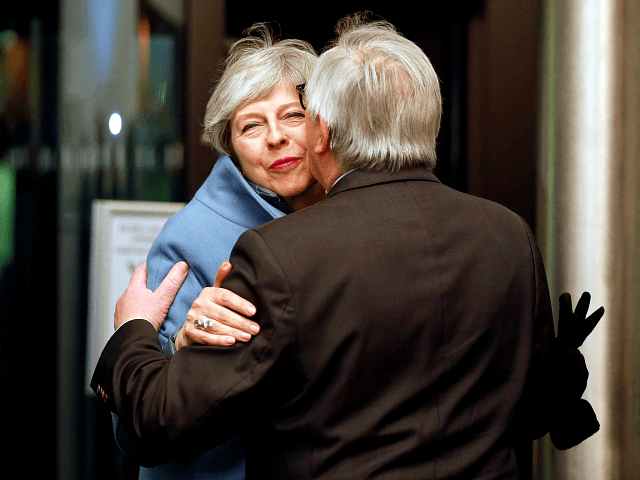Reactions to the second rejection of Theresa May’s deal with the European Union have been rolling in from Brexiteers both within and without Parliament, with MPs defending their decision to vote against the Prime Minister but fearful of her planned free vote on taking “No Deal” off the negotiating table.
Nigel Farage MEP, who was ad hoc leader of the Brexit campaign for many a long year before the term was even coined, declared that the deal’s rejection and Mrs May’s subsequent decision to put “No Deal” — currently the legal default come March 29th — to a free vote, with her Remainer-dominated Government having no fixed position on the issue, was a “total failure of leadership”.
This is a total failure of leadership.
— Nigel Farage (@Nigel_Farage) March 12, 2019
Richard Tice, co-founder of the Leave.EU campaign which was the larger of the two major Brexiteer groups during the EU referendum and now co-chairman of the Leave Means Leave campaign alongside Farage, said MPs were right to have voted down “the worst deal in history” but warned that they must not take No Deal off the table.
More specifically, he demanded that should the Prime Minister herself vote against No Deal, she must resign, having stated repeatedly that “no deal is better than a bad deal” both during and after the 2017 snap election from which she derives her democratic mandate, such as it is.
If PM votes today to take No deal off the table she should resign. She has constantly said No deal is better than bad deal. Parliament has twice said its a bad deal. So let’s leave with No deal.
— Richard Tice (@TiceRichard) March 13, 2019
Tory Brexiteers who sit in Parliament seem somewhat less combative, apparently dreading the prospect of their Remainer colleagues voting to effectively strangle a clean Brexit — and possibly any Brexit at all — in today’s free vote on No Deal.
Jacob Rees-Mogg, who leads the European Research Group (ERG) of Brexiteer Tories, told the BBC that the fundamental problem “is that we have a historic disconnection between the House of Commons and the electorate; 52 percent of the voters voted to leave, but in the House of Commons probably 500 out of 650 MPs supported Remain, and this disconnect is actually quite troubling for our politics, because the House of Commons is ignoring the majority of the British people.”
Indeed, conservative philosopher Edmund Burke, whose famous Bristol address is often used by modern MPs as an excuse to ignore the wishes of their electors, warned in his Thoughts on the Present Discontents that the House of Commons “was not instituted to be a control upon the people… It was designed as a control for the people.”
He added that it would be better “that the House of Commons should be infected with every epidemical [frenzy] of the people, as this would indicate some consanguinity, some sympathy of nature with their constituents, than that they should in all cases be wholly untouched by the opinions and feelings of the people out of doors,” because “By this want of sympathy they would cease to be a House of Commons.”
.@Jacob_Rees_Mogg: "52% of voters voted to leave, but probably 500 out of 650 MPs voted to remain" pic.twitter.com/GYmKlULhNr
— BrexitCentral (@BrexitCentral) March 12, 2019
Other MPs appeared to be more sanguine, with former Brexit minister Steve Baker, who resigned from Mrs May’s government along with Secretary of State David Davis over the terms she was proposing for the deal and accused her of having abused the constitution to put it together, using its defeat as an excuse to table to so-called “Malthouse Compromise” as a parliamentary amendment.
Rees-Mogg’s signature was appended to the document alongside Baker’s, although apparently not in his own hand, alongside that of other prominent Brexiteers including former Tory leader Iain Duncan Smith — but the involvement of equally prominent Remainers including Nicky Morgan and Mrs May’s former right-hand man Damian Green may give many Brexit supporters pause for thought about the scheme.
Heading to table a #MalthouseCompromise Plan B amendment with @DamianGreen, @NickyMorgan01 and @Simonhartmp, supported by @Jacob_Rees_Mogg, @NigelDoddsDUP and Iain Duncan Smith pic.twitter.com/LzMbozTinJ
— Steve Baker MP (@SteveBakerHW) March 12, 2019
The Prime Minister was under no obligation to allow MPs to effectively overturn the British people’s vote to Leave the European Union by offering them a vote on taking “No Deal” off the table — handing Brussels the power to kill Brexit stone dead by refusing to offer anything but unacceptable terms — as it would have been within her constitutional power to call on the Queen to prorogue (suspend) the parliamentary session until after March 29th, when No Deal would have occurred by default under the terms of the European Union (Withdrawal) Act of 2018.
That she is allowing her openly rebellious Remainer ministers a free vote on the issue — while Brexiteers were not allowed to take a position against her deal — has led many to question whether she ever intended to deliver a clean Brexit in any circumstances.

COMMENTS
Please let us know if you're having issues with commenting.